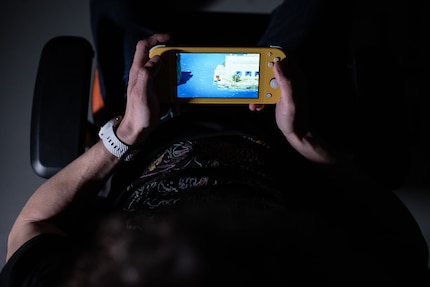
Opinion
These seven games are just perfect
by Domagoj Belancic

Music, movies, games: everything is available to us at all times, in abundance wherever we go. Sounds like a dream, yet often ends up as the opposite. Time to dig into our collective psyche.
Things used to be so much simpler. I came home from my apprenticeship around 5 p.m. Just in time for a staple of millennial television: the Siiimpsoons on SF 2. Cue half an hour of laughter, followed by dinner and discussing yesterday's episode with your mates at work next morning. Contrast this with the situation as it is now. «Did you see the new ‹Simpsons› episode last night?» «Didn't get a chance. We're watching ‹Big Bang Theory›, and there's a new season of ‹Brooklyn Nine-Nine› as well as ‹Parasite› waiting for us. I've been trying to get through ‹The Witcher 3› for three years now.» The growing popularity of all-you-can-eat services such as Spotify, Netflix or Xbox Game Pass is drowning us in entertainment. This has significantly changed our consumer behaviour.
When I was a kid, we only had six TV channels at home, two of them in French. This restricted our selection so much that even a «James Bond Moonraker» rerun was considered a highlight. When we finally inherited my grandma's old VHS, the rigid walls of SF 1, ARD and Co. crumbled. Suddenly, we were allowed to browse video stores or swap films with friends.

When I entered high school, my parents installed a satellite dish. The available number of channels grew immeasurably. And yet, even those 250+ channels pale in comparison to what we have today. Free from fixed broadcasting times, we can binge our favourite series, one season after the next. As long as we can decide on something. While we used to spend hours shuffling through the shelves of the video store, we now spend the same amount of time in Netflix's digital libraries. But unlike back then this has become a near daily occurrence.
And Netflix is by no means alone: Youtube, Twitch, Disney+, cinemas – they are all vying for our attention. All with countless must-see series and films waiting to be consumed. This all-inclusive offer ensures that we will be stuck in front of the screen more and more. According to the German Association of Private Media, average media usage has already ballooned to nine hours a day. Smartphones are clearly the biggest reason for this. We can't even ignore them when we watch TV. Finally, dozens of Whatsapp messages, Twitter posts and Instagram images demand to be viewed and clicked.

At the same time, movies or series are still harmless in terms of time required. Say you just finished watching «The Witcher» featuring Henry Cavill on Netflix. You decide to give the game of the same name a try. Well, time to clear around 100 hours from your schedule. At least. As your resident games editor, this really grinds my gears. I would like to play all good games, thank you very much. But not only are there more and more of them every year, developers also drive me crazy with their «game as a service» model. Trickling out new content and events every few months, ensuring that I'll never really be done. Great, but also pure hell. And the fact that new Netflix-like game flatrates keep popping up makes all time management obsolete, on top of making the decision between which title to play near impossible.
But even that isn't enough. New episodes are constantly piling into my podcast bin. Even at one and a half times the speed and automatic pause distance, I'll never be able to hear everything. New music is a bit less stressful. But even this can vary. Spotify and Co. have used flat-rate services for years, giving you free-reign over whatever pleases your ears.
And what about reading? According to statistics database Statista, the time people spend with books is declining. I myself have a never-ending list of comics, novels and non-fiction that I would love to devour. Needless to say, there are flat rate offers for this as well.

Do I wake up every night in a cold sweat because of this oversupply of media? No, I'm not that crazy. Yet. But I'm constantly plagued with thoughts about what I should consume next. Should I read a book during my morning commute? I'd rather play something on my Switch, then I could listen to a Podcast at the same time. Or would I rather watch a new video from my Youtube subscriptions? This problem grows exponentially as evening approaches. Should I watch a show? How about gaming? The board game I started has been occupying the dining table for two weeks, and I haven't been to the cinema for ages.
Daniel Süss, professor at the Psychological Institute of the Zurich University of Applied Sciences, is familiar with this phenomenon: «From decision research, we know that when you have many options to choose from, it's harder to make a decision.» It's a very human problem, he says. One has more doubts about a large offer than about a small one, about having made the right decision. According to Süss, this is because we want to try out everything.
In addition, there are many more personalized offers available today. The Internet knows what we like and constantly suggests new things that might interest us. In technical language, this is called «nudging». «This personalized nudging relieves us from some of the decision-making work and encourages us to say yes more often,» Süss says.

Another aspect concerns the increase in serial offers, which are often linked to cliffhangers. It's hard to back out when you're in the middle of a story. Süss compares it to a relationship. «When a couple has been happily together for a long time, the partners find it hard to part. You've built and invested a lot into this relationship.» Same when it comes to serial offers. You've dealt with the characters and story, investing a lot of empathy.
With mass phenomena such as «Game of Thrones», «FOMO» is added to the mix: a fear of missing out. Or the fear of missing something, anything. Fomo refers primarily to social situations. If a topic is hyped up among friends or in the media, a fear that you won't be able to have a say arises.
But these aren't the only things that circle above me like grey thunderclouds. Abundance has changed my behaviour as a consumer. I used to watch television, play games or listen to music more consciously. Getting a new CD as a present was something special. Each album I got, I took the time to make a mini-disc copy and label the thing myself. If I ever had more than one new game at the same time, I didn't know what to do with my euphoria.

«We've got to a point where we almost can't handle standing idly by anymore», Süss adds. It has become extremely easy to consume a lot with practically no additional cost. «With subscription models, this even works the other way around. You better consume as much as you can, and you feel stupid when not doing anything.» And as soon as we're done with a series, we fall into a hole of understimulation. This in turn leads us to quickly look for the next fix.
Does this make me want to turn my back on this great range of products? Hell no! I think it's cool that there's such a wide choice. Quality has even increased. Today, thanks to Xbox Game Pass, Netflix or Google Music, I can fly from game to series to song like a bee in a meadow. If I don't like something after ten minutes, I just try the next thing. I used to waste my time with trash TV like «Herkules», «Xena», talk shows and, if I was really desperate, soap operas. In conclusion, I prefer today's agony of choice by a wide margin. If only I just had a bit more time...
As a child, I wasn't allowed to have any consoles. It was only with the arrival of the family's 486 PC that the magical world of gaming opened up to me. Today, I'm overcompensating accordingly. Only a lack of time and money prevents me from trying out every game there is and decorating my shelf with rare retro consoles.
This is a subjective opinion of the editorial team. It doesn't necessarily reflect the position of the company.
Show all